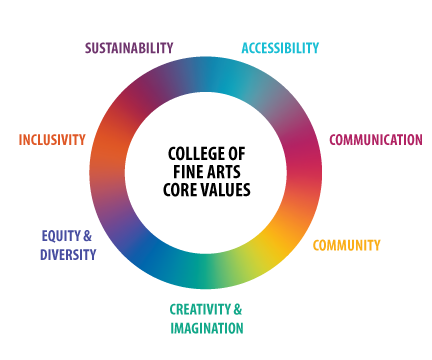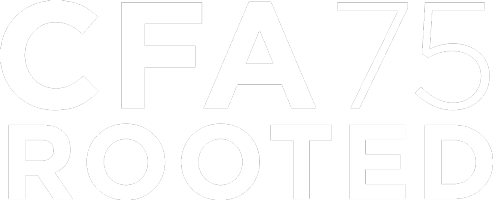About the College
The arts have always maintained a place of prominence in Utah. Early settlers began building theatres and dance halls at the same time they started construction on homes and businesses. The fledgling University of Deseret, founded in 1850, was dedicated to “fine art and sciences.” As that institution evolved into The University of Utah, a central focus on the importance of the performing and visual arts remained. The College of Fine Arts was officially established in 1948 and has continued to grow and flourish for the past 70 years. The College is home to the Department of Art & Art History, the School of Dance, the Department of Film & Media Arts, the School of Music, and the Department of Theatre.
We see the future as an exciting time for all of the arts and the College of Fine Arts at the University of Utah is committed to being a leader in the field well into the future. A rigorous course of study, high standards of achievement, a history of success, and a list of celebrated alumni have resulted in national recognition for our academic units.
College of Fine Arts Strategic Plan
 In Spring 2019, the College of Fine Arts College Council ratified the College of Fine Arts Strategic Plan aiming to achieve 4 major goals and uphold the College of Fine Arts core values.
In Spring 2019, the College of Fine Arts College Council ratified the College of Fine Arts Strategic Plan aiming to achieve 4 major goals and uphold the College of Fine Arts core values.
Goal 1: Develop and Transfer New Knowledge
Goal 2: Promote Student Success to Transform Lives
Goal 3: Engage Communities to Improve Health and Quality of Life
Goal 4: Ensure Long-term Viability of the College of Fine Arts
Faculty Policies for the College of Fine Arts
Some policies and information for faculty are specific to the College of Fine Arts. Information regarding topics such as RPT (retention, promotion, and tenure), faculty absences, sabbatical leaves, curriculum policies may be found on the college’s Faculty & Staff Resources webpage. It is important that you familiarize yourself with the policies that pertain to you. We also suggest you review the college charter.
Professional Expectations for Faculty
Community
Community is one of the CFA’s core values. (See our Strategic Plan). We believe that a true sense of community exists when individuals hold a reciprocal respect toward one another, to the group, and to the institution. In an effort to build and sustain a sense of community, we continually strive to cultivate a place where all voices and ideas are respected. Thus, we expect our faculty to act with honesty and integrity, to exhibit collegiality, and foster equity.
With this in mind, we highly suggest you review the university’s faculty code (Code of Faculty Rights and Responsibilities, Policy 6-316), which outlines expectations for professional conduct.
Honesty & Integrity are expected of all faculty members. Strong communities are built by individuals who act with honesty and integrity. Consistent demonstration of these two traits establishes trust. Keep your word and do the right thing, even when it may be difficult.
Collegiality may be defined as a reciprocal relationship among colleagues who are aligned by shared values and goals – in our case, these are the values and goals of the university, the college, and your home department. Our faculty and staff are expected to take responsibility for maintaining positive and productive working relationships, which are critical to the success of our university community. Equity addresses notions of fairness and impartiality, and the CFA believes in striving for equity in a multiplicity of ways. In this vein, we recognize equity, diversity, and inclusion as core values (as represented in our Strategic Plan), and we understand diversity as a source of enrichment for our campus community and beyond. Thus, we encourage all faculty members to:
-
-
- Explore the learning management system provided by the U, The Bridge. The Bridge offers training modules for university employees and is available through the Employee tab of CIS. Employees can access a variety of short instructional courses on diversity, sexual harassment, intergenerational learning, and collaboration in the workplace, among other topics.
- Engage with the multiple campus entities that support the university’s equity and diversity initiatives, such as the Office for Equity & Diversity and the School for Cultural and Social Transformation.
-
Communication
Communication is a core value of the CFA. (See our Strategic Plan.) Clear, open, professional communication is key to a successful campus community. In that vein, we offer the following tips:
Effective Communication Skills
-
-
- Be clear and concise
- Be calm and consistent
- Listen to hear and understand, rather than to respond
- Use and read nonverbal communication / body language
- Remain open-minded
- Exhibit respect and practice empathy
- Select the appropriate medium (some complex and/or fraught issues are better discussed in person)
-
Email Communication
Remember that your email communication reflects on you, your department, the college, and the university. Be thoughtful about what you put in writing. Would you want it on the front page of the newspaper? Use your Umail account (never a personal email account) for all university business. For communication with students we recommend using only Umail or Canvas.
Email Etiquette:
-
-
- Responding – Make every effort to respond in a timely manner (48 hrs is the general rule). If you expect longer delays, it is best practice to set-up your Umail to automatically reply explaining the delay.
- Reply all – Think twice before you reply to everyone on an email thread.
- Forwarding – Unless it is an emergency, use caution when forwarding an email without the consent of the sender. Be mindful of inadvertently sharing confidential information.
-
Mechanics of Writing a Professional Email:
-
-
- Have a clear subject line.
- Use a professional salutation (i.e., Hello, Dear, etc.)
- Don’t assume the recipient knows what you are talking about.
- Refrain from overusing all CAPS or exclamation points.
- Refrain from sending an email in anger. Take time to consider the most effective and appropriate response.
- Include a signature. Keep in mind that you can set up a professional automatic signature for your Umail account.
-
Personal Contact Information – Since the university expects all business email communication to occur through Umail, we discourage faculty from sharing personal email addresses. Additionally, use caution when sharing personal contact information (phone numbers, home addresses, etc.) with students. Contact with students that is related to university business should only occur through official university systems (Umail, Canvas, office phone). Also note that the information on your professional materials (such as a CV) that are uploaded to your faculty profile will be easily accessible, so we recommend that the only contact information you include on such documents be your Umail.
Social Media – Social media can be a precarious place for professional relationships. While there are no specific university policies that dictate faculty social media practices, we recommend that you remain mindful about social media use, what you share publicly, and who you connect with.
Respect for Time
On campus, most people are busy and regard their time as a highly valuable commodity. Valuing and respecting other people’s time is simply a sign of respect.
Deadlines – Deadlines exist for a reason, and at the U there are many deadlines for faculty (posting syllabi, entering grades, etc.). When deadlines are missed, it often creates a domino effect of problems for others. Make every effort to meet deadlines. If it is impossible, communicate the delay clearly and, when possible, offer an alternate deadline or other solutions.
Punctuality – Meetings (for committees, classes, etc.) are ubiquitous on campus. Arrive on time so that others are not inconvenienced. While occasional instances of tardiness are unavoidable, consistent lateness demonstrates a lack of respect for others.
Preparation – Arrive for classes and meetings prepared, whether that means having planned your class or having read a committee report. A lack of preparation is unfair to those depending on you.

